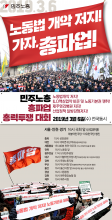PSI supports KCTU’s general strike for ratification of ILO Core Conventions without regression

PSI statement in support of the KCTU’s General Strike for ratification of ILO Core Conventions without Regression
4 March 2019
Public Services International (PSI) expresses its support for the KCTU General Strike and concern that social dialogue towards ratification of ILO Core Conventions 87 (freedom of association) and 98 (collective bargaining) in the Republic of Korea appears to be moving in the direction of actually weakening fundamental labour rights.
Discussions on ratification of ILO conventions and revision of labour law are currently taking place in the Committee on Improvement of Labour Relations Law and Practice of the Economic, a subcommittee of the Social and Labour Council (ESLC), a social dialogue body established by South Korean President Moon Jae-in. The committee is scheduled to issue recommendations on labour law revision on March 7.
Public interest members of the committee have already issued recommendations on labour law revision, which fall well below international standards by failing to guarantee trade union rights for self-employed workers, maintaining restrictions on freedom of association and political activities for government employees and teachers, and calling for new concrete limitations on the participation of dismissed and unemployed workers and officers of unions formed above the company level. Legislation based on these recommendations, but that is even more restrictive, has already been proposed in the National Assembly.
Further, PSI has learned that employers’ representatives involved in the ESLC process have called for further revisions of the Trade Union and Labour Relations Adjustment Act (TULRAA), which put even greater restrictions on trade union rights, particularly the right to strike, while granting employers new powers, such as to make claims of ‘unfair labour practices’ against unions. The Moon Jae-in government has indicated willingness to accept many of these demands, claiming this is necessary to win support for ratification of ILO conventions.
PSI is particularly concerned that throughout committee discussions, guarantees for self-employed and precarious workers are being side-lined. The ILO Committee on Freedom of Association has, on several occasions, recommended that the South Korean government take the necessary steps to protect the rights to freedom of association and collective bargaining for these workers. The European Commission, which is currently engaged in formal consultation over the Korean government’s failure to live up to obligations under the EU-ROK FTA, has also raised the issue of the exclusion of self-employed, unemployed and dismissed workers from the right to freedom of association as an essential issue the South Korean government must address.
The question of a system of minimum services in line with ILO standards has been left out of the discussion. As it now stands, the broad and vague definition of ‘public interest businesses’ in South Korean labour law means that many public institutions and other sectors not considered ‘essential services in the strict sense of the term’ have set excessively high levels of minimum services to be maintained during strikes and that employers may freely use replacement workers to break strikes.
The ILO has also recommended on several occasions that restrictions on the right to strike in workplaces that are not ‘essential services in the strict sense of the term’, such as railway, airlines and energy companies be keep to a minimum and that unions be granted the right to participate on equal footing with employers in deciding these minimum levels.
PSI General Secretary Rosa Pavanelli has expressed her concern over these developments, stating:
“Since 1996 when South Korea joined the OECD, the government has made repeated promises to the international community to ratify ILO Core Conventions and improve the legal framework on trade union rights. PSI welcomed President’s Moon promise to live up to these commitments when he first took office, but has been disappointed by what has followed since. The current discussions that tie regressive revision of the labour law to ratification of ILO conventions and ignore past ILO recommendations are unacceptable. Dialogue concerning ratification of ILO conventions should take place following a strict commitment to the principle of non-regression in existing laws and with a view towards actually improving the rights of workers in South Korea.”

